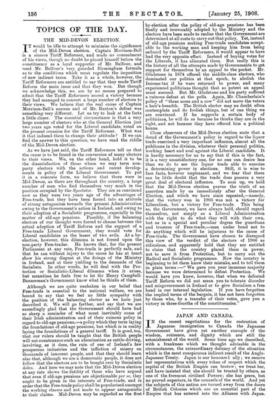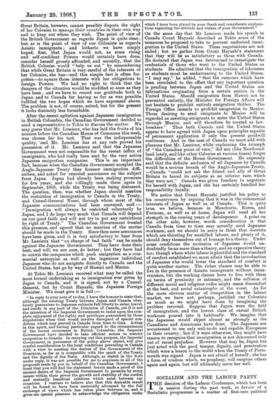JAPAN AND CANADA.
IN the recent negotiations for the restriction of Japanese immigration to Canada the Japanese Government have given yet another example of the wisdom, reticence, and dignity which are still the astonishment of the world. Some time ago we described, with a frankness which we thought advisable in the circumstances, the extraordinary delicacy of the situation which is the most conspicuous indirect result of the Anglo- Japanese Treaty.. Japan is our honourel ; we receive her representatives with every token of respect which the capital of the British Empire can bestow ; we treat her, and have insisted that she should be treated by others, as one of the foremost civilised Powers ; she has peers, but no proved superiors, in the counsels of the world. And Yet the subjects of this nation are turned away from the doors of British Colonies which are an essential part of the Empire that has entered into the Alliance with Japan. Great Britain, however, cannot possibly dispute the right of her Colonies to manage their countries in their own way and to keep out whom they wish. The point of view of the British Government as regards Japan is quite clear ; but so is the point of view of our Colonists as regards Asiatic immigrants ; and hitherto we have simply hoped, first, that Japan would not, as some rising and self-confident Powers would certainly have done, consider herself grossly affronted, and secondly, that the British Colonies would "help us out" by remembering that while Great Britain is very careful of the interests of her Colonies, she has—and this simple fact is often for- gotten—to square those interests with her obligations to foreign Powers. We had no right to think that the dangers of the situation would be modified so soon as they have been ; and we have to record our gratitude both to Japan and to Canada for having so far as was possible fulfilled the two hopes which we have expressed above. The problem is not, of course, solved, but for the present it looks distinctly less formidable.
After the recent agitation against Japanese immigration in British Columbia, the Canadian Government decided to send a representative to Tokio to discuss the matter. We may guess that Mr. Lemieux, who has laid the fruits of his mission before the Canadian House of Commons this week, was chosen for his tact. That was the indispensable quality, and Mr. Lemieux has at any rate proved his possession of it. Mr. Lemieux said that the Japanese Government were not responsible for the recent influx of immigrants, who had really been sent by the very active Japanese emigration companies. This is an important fact, because when the Canadian Government accepted the Anglo-Japanese Treaty they foresaw immigration diffi- culties, and asked for renewed assurances on the subject from Japan. Japan had already been making promises for five years, and she i illingly made them again in September, 1905, while the Treaty was being discussed. The question, then, was whether Japan should mention the restriction of immigration to Canada in the Treaty, and Consul-General Noss& through whom most of the Japanese communications had been conveyed, said :— "immigration will always be restricted voluntarily by Japan, and I do hope very much that Canada will depend on our good faith and will not try to put any restrictions by right of Treaty." The Canadian Government trusted this promise, and agreed that no mention of the matter should be made in the Treaty. Since then more assurances have been given, and it is very satisfactory to hear from Mr. Lemieux that "no charge of bad faith" can be made against the Japanese Government. They have done their best, and will, we are sure, do better ; but they have had to outwit the companies which push emigration as a com- mercial enterprise as well as the ingenious individual Japanese who do not emigrate directly to Canada and the United States, but go by way of Hawaii and Mexico.
At Tokio Mr. Lemieux received what may be called the most formal undertaking as to immigration ever given by Japan to Canada, and it is signed, not by a Consul- General, but by Count Hayashi, the Japanese Foreign Minister. We must give it in full :— "In reply to your note of to-day, I have the honour to state that, although the existing Treaty between Japan and Canada abso- lutely guarantees to Japanese subjects full liberty to enter, travel, and reside in any part of the Dominion of Canada, yet it is not the intention of the Imperial Government to insist upon the com- plete enjoyment of the rights and privileges guaranteed by those stipulations when that would involve disregard of special con- ditions which may prevail in Canada from time to time. Acting in this spirit; and having particular regard to the circumstances of the recent occurrence in British Columbia, the Imperial Government have decided to take efficient means to restrict emigration to Canada. In carrying out this purpose, the Imperial Government, in pursuance of the policy above stated, will give careful consideration to the local conditions prevailing in Canada with a view to meeting the desires of the Government of the Dominion, as far as is compatible with the spirit of the Treaty and the dignity of the State. Although, as stated in the Note under reply, it was not possible for me to acquiesce in all of the proposals made by you on behalf of the Canadian Government, I trust that you will find the statement herein made a proof of the earnest desire of the Imperial Government to promote by every means within their power the growth and stability of the cordial and mutually beneficial relations which exist between our countries. I venture to believe also that this desirable result will be found to have been materially advanced by the full exchange of views which has taken place between us, and it gives me special pleasure to acknowledge the obligation under
which I have been placed by your frank and considerate explana- tions regarding the attitude and wishes of your Government."
On the same day that Mr. Lemieux made his speech in Canada Count Hayashi described at Tokio some of the measures be proposed to take to prevent undesired immi- gration to the United States. These negotiations are not ended ; but we gather ,from Count Hayashi's statement that they will be as satisfactory as those with Canada. He declared that Japan was determined to investigate the credentials of those who went to the United States as students. He admitted that the immigration of labourers as students must be embarrassing to the United States. "I may say," he added, "that the rumours which have been circulated to the effect that any important question is pending between Japan and the United States are fabrications originating from a certain section in the United States. Should emigration from Hawaii not be prevented entirely, the Minister for Foreign Affairs will not hesitate to prohibit entirely emigration thither. The Foreign Office intends to prohibit emigration to Mexico. Those desiring to send emigrants to Mexico will be regarded as assisting emigrants to enter the United States through Mexico, and will therefore be treated as law- breakers." Thus both Canada and the United States appear to have agreed with Japan upon principles capable of permanent application if only the present goodwill continues. And in the case of Canada we must add with pleasure that Mr. Lemieux, while explaining the triumph of "the Canadian point of view," did not (like Newfound. land lately, and like other Colonies at various times) forget the difficulties of the Home Government. He expressly said that the definite exclusion of all Japanese by Canada would be a serious breach of the Anglo-Japanese Treaty, —Canada "could not ask the friend and ally of Great Britain to brand its subjects as an inferior race, which they were not." Canada was given freedom to negotiate for herself with Japan, and she has certainly handled her responsibility loyally.
We notice that Count Hayashi justified his policy to his countrymen by arguing that it was in the commercial interests of Japan as well as of Canada. This is quite true, we believe, because in Manchuria, Korea, and Formosa, as well as at home, Japan will need all her strength in the coming years of development. A point on the other side, however, worth consideration is that Canada from time to time may actually need Japanese workmen, and we should be sorry to think that districts which are thirsting for unskilled labour, and plenty of it, should deny themselves out of homage to a theory. Under some conditions the exclusion of Japanese would un- doubtedly be no more than a theory, and an expensive theory too; though where white labour is plentiful and the standard of comfort established we must admit that the introduction of Japanese who would lower the standard of comfort is quite another matter. The richer classes may be able to live in the presence of Asiatic immigrants without incon- veniehce, but the working classes have to live with them on terms of proximity or intimacy, and the collision of different moral and religious codes might mean discomfort at the best, and social catastrophe at the worst. As for the more obvious matter of competition in the labour market, we have not, perhaps, justified our Colonists as much as we might have done by imagining the problem reversed. Suppose that Japan were the field of immigration, and the lowest class of casual British workmen poured into it habitually. We imagine that the Japanese would object almost as strongly as the Canadians and Americans have done. The Japanese are accustomed to see only well-to-do and capable Europeans in their country ; but if it were otherwise, they might have reason to recognise that immigration is not denounced only out of racial prejudice. However that may be, Japan has just acted with the good temper, dignity, and penetration which were a lesson to the world when the Treaty of Ports- mouth was signed. Japan is not afraid of herself ; she has a form of wisdom which, we prophesy, will surprise others again and again, but will ultimately serve her well.





















































 Previous page
Previous page